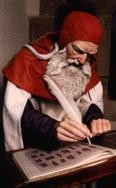
AUTHOR LINKS
Robert Henryson
One of Scotland’s medieval makars, relatively little is known about Robert Henryson (sometimes spelt Henrysoun), but some reasonable assumptions can be made about his background in examining his work. He is believed to have attended Glasgow University and has also been associated with Dunfermline as a schoolmaster, lawyer or notary public. The scope of subjects referred to in his works indicates that he was an academic – a reference to Henryson in a poem by William Dunbar suggests he had a Masters degree and also places his date of death (from dysentery) at some point before 1505. Along with William Dunbar and Gavin Douglas, Robert Henryson is considered to be one of the ‘The Makars’ of the northern Renaissance known for their skilful use of verse and lyrical style.
One Henryson’s most famous works, the Morall Fabillis of Esope the Phrygian, is a cycle of thirteen fables in the Aesopic tradition that translates the original European tales into middle Scots with Henryson’s own literary touch. The fables, though a common setting at the time, are told in a way that elevates their status into a high art form and are a particularly complex and significant example of the genre. Orpheus and Eurydice is another of Henryson’s long works and is an interpretation of a Greek myth more commonly read in Latin at the time. While The Testament of Cresseid takes its title character from Chaucer’s Troilus and Criseyde, it is an original work that goes beyond the source text in imagining a tragic fate for a character whose story was largely left untold in Chaucer’s version. The Irish poet Seamus Heaney made a new translation of The Testament of Cresseid in 2009.
Henryson is also credited with twelve short works that include Robene and Makyne and The Abbay Walk (about Dunfermline Abbey), however it is difficult to date these and there is much debate over the point in Henryson’s life when these poems were written.
Henryson is an important figure in Scottish literary history and his contribution to Scotland’s literary canon is perhaps not as well-known or appreciated as that of Burns, although it certainly should be.









